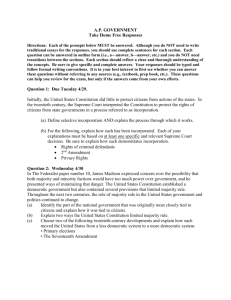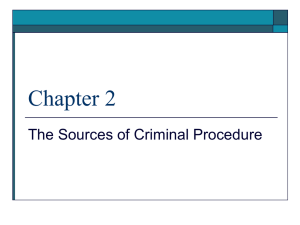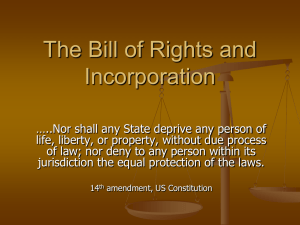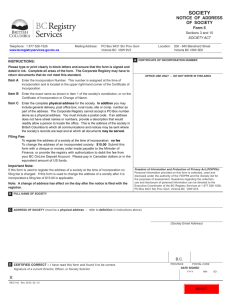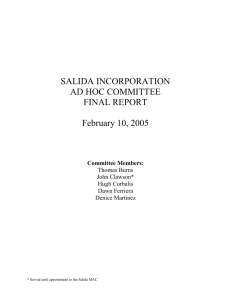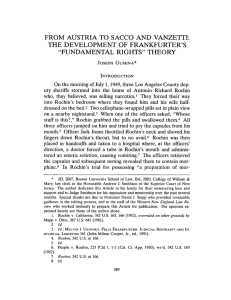What are our fundamental freedoms as Americans?
advertisement
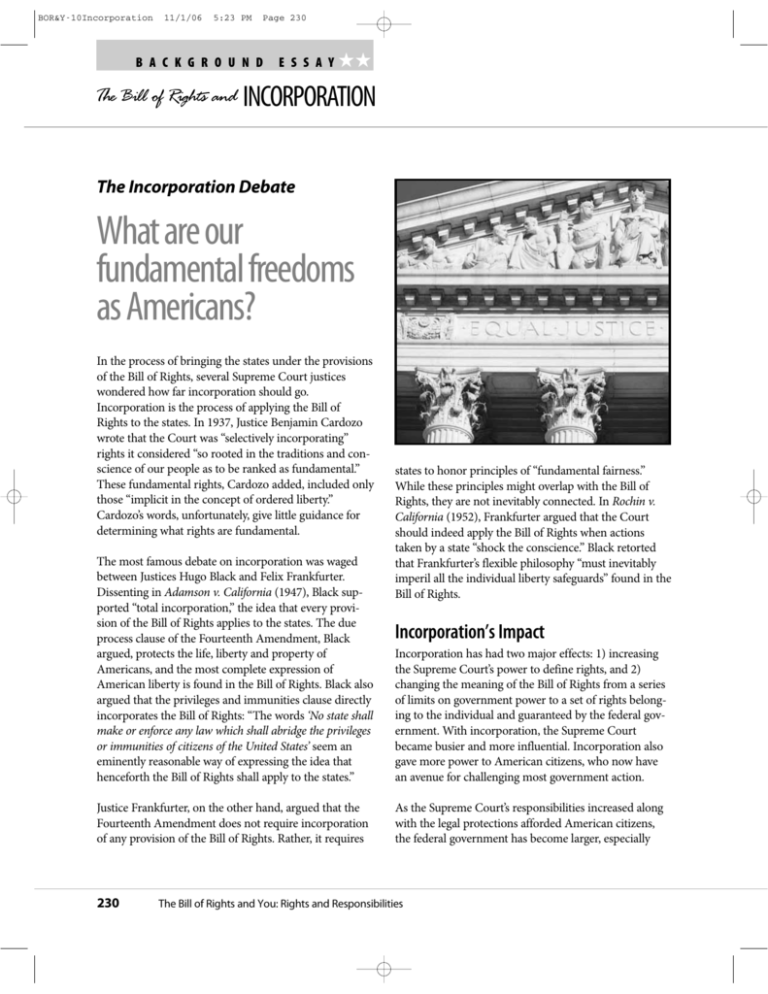
BOR&Y-10Incorporation 11/1/06 5:23 PM Page 230 B A C K G R O U N D The Bill of Rights and E S S A Y ★★ INCORPORATION The Incorporation Debate What are our fundamental freedoms as Americans? In the process of bringing the states under the provisions of the Bill of Rights, several Supreme Court justices wondered how far incorporation should go. Incorporation is the process of applying the Bill of Rights to the states. In 1937, Justice Benjamin Cardozo wrote that the Court was “selectively incorporating” rights it considered “so rooted in the traditions and conscience of our people as to be ranked as fundamental.” These fundamental rights, Cardozo added, included only those “implicit in the concept of ordered liberty.” Cardozo’s words, unfortunately, give little guidance for determining what rights are fundamental. The most famous debate on incorporation was waged between Justices Hugo Black and Felix Frankfurter. Dissenting in Adamson v. California (1947), Black supported “total incorporation,” the idea that every provision of the Bill of Rights applies to the states. The due process clause of the Fourteenth Amendment, Black argued, protects the life, liberty and property of Americans, and the most complete expression of American liberty is found in the Bill of Rights. Black also argued that the privileges and immunities clause directly incorporates the Bill of Rights: “The words ‘No state shall make or enforce any law which shall abridge the privileges or immunities of citizens of the United States’ seem an eminently reasonable way of expressing the idea that henceforth the Bill of Rights shall apply to the states.” Justice Frankfurter, on the other hand, argued that the Fourteenth Amendment does not require incorporation of any provision of the Bill of Rights. Rather, it requires 230 states to honor principles of “fundamental fairness.” While these principles might overlap with the Bill of Rights, they are not inevitably connected. In Rochin v. California (1952), Frankfurter argued that the Court should indeed apply the Bill of Rights when actions taken by a state “shock the conscience.” Black retorted that Frankfurter’s flexible philosophy “must inevitably imperil all the individual liberty safeguards” found in the Bill of Rights. Incorporation’s Impact Incorporation has had two major effects: 1) increasing the Supreme Court’s power to define rights, and 2) changing the meaning of the Bill of Rights from a series of limits on government power to a set of rights belonging to the individual and guaranteed by the federal government. With incorporation, the Supreme Court became busier and more influential. Incorporation also gave more power to American citizens, who now have an avenue for challenging most government action. As the Supreme Court’s responsibilities increased along with the legal protections afforded American citizens, the federal government has become larger, especially The Bill of Rights and You: Rights and Responsibilities BOR&Y-10Incorporation 11/1/06 5:23 PM Page 231 ★★ B A C K G R O U N D The Bill of Rights and since 1900. The federal government has expanded in regard to business regulation in the early 1900s, New Deal programs (1930s), military strength during World War II, antipoverty Great Society programs (1960s), environmental regulation and education (1970s), nuclear arms race in the Cold War Era, and health entitlements in the 1990s. During the same period, state governments have also expanded. All this growth in local, state, and federal activities has extended the Court’s reach as the number of possible conflicts involving the law has risen. In response to the increase in the Court’s power, Americans have shifted their view of themselves as citizens. Well into the nineteenth century, most Americans thought of themselves as citizens of their respective states. With the Bill of Rights applying to the states and state sovereignty declining during the Civil War, the Progressive Era, and the New Deal, Americans began to see the federal government as the main protector of their rights. With these changes, citizens began to think of themselves as citizens of America, rather than their individual states. E S S A Y INCORPORATION Some legal scholars applaud federally guaranteed rights as the fulfillment of the Declaration of Independence and its promise of inalienable rights. They also point to instances where states’ infringements of individual rights were in desperate need of remedy. Critics complain, however, that federal dominance undermines the Founders’ ingenious system of federalism, which was designed to protect the rights of individuals from the federal government along with the sovereignty of states. One point is clear: A powerful Supreme Court—which acts as the protector of individual rights—makes understanding the specific protections listed in the Bill of Rights more important than ever. Since the United States government depends on the consent of the governed, it is the responsibility of citizens to know their rights, and understanding the doctrine of incorporation is an essential part of this task. INCORPORATION | LESSON 2 231
